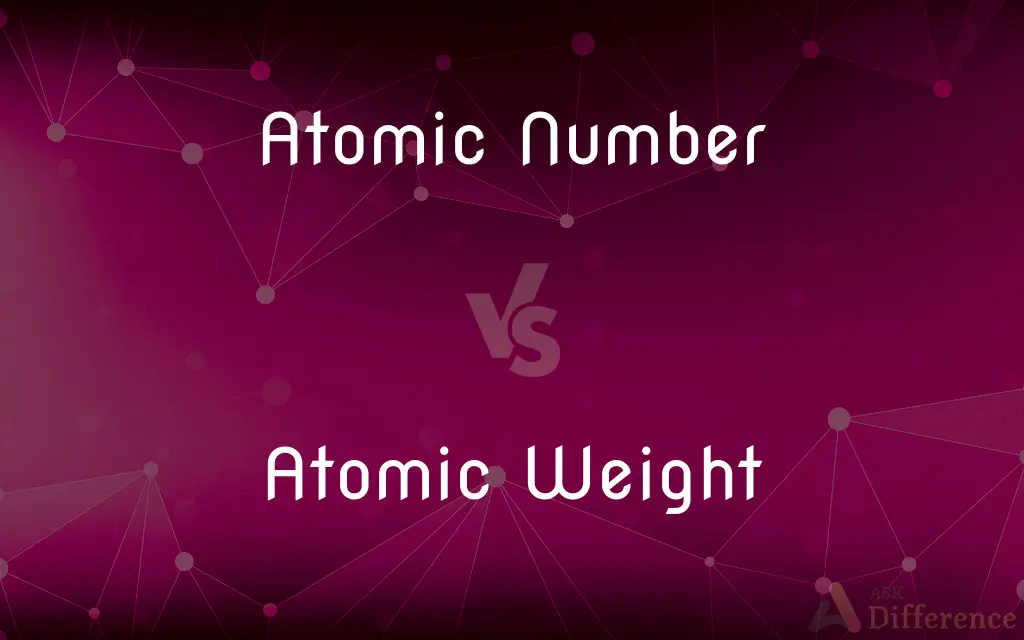Atomic Number vs. Atomic Weight — What's the Difference?
By Tayyaba Rehman — Published on November 19, 2023
Atomic Number indicates the number of protons in an atom's nucleus, while Atomic Weight represents an element's average mass based on its isotopes.

Difference Between Atomic Number and Atomic Weight
Table of Contents
ADVERTISEMENT
Key Differences
Atomic Number is fundamental in defining an element. Every element on the periodic table is distinguished by its unique Atomic Number, representing the number of protons within its nucleus. This number essentially dictates an element's identity. If you change the Atomic Number, you change the element.
On the other hand, Atomic Weight, sometimes called atomic mass, is a more nuanced concept. It reflects the average mass of an element, taking into account all its naturally occurring isotopes. While Atomic Number deals strictly with protons, Atomic Weight considers both protons and neutrons, as both contribute to an atom's mass.
Atomic Number is always a whole number because you can't have a fraction of a proton. For instance, carbon, with an Atomic Number of 6, always has 6 protons. Atomic Weight, however, can be fractional. This is because it's an average of the masses of an element's isotopes, which may have varying numbers of neutrons. The presence of these different isotopes causes the average mass to not always be a whole number.
One can infer an element's properties based on its Atomic Number due to the periodicity of the periodic table. Elements with similar Atomic Numbers often share characteristics. However, Atomic Weight can provide insights into the isotopic composition of an element, revealing details about its physical and chemical behavior.
In essence, while both Atomic Number and Atomic Weight provide vital information about an element, they serve different purposes. Atomic Number tells us about an element's identity and properties, while Atomic Weight gives insight into its mass and isotopic composition.
ADVERTISEMENT
Comparison Chart
Definition
Number of protons in the nucleus.
Average mass based on isotopes.
Integral Value
Always a whole number.
Can be fractional.
Contribution
Protons only.
Protons and neutrons.
Uniqueness
Unique for each element.
Can vary based on isotopic abundance.
Role
Determines element's identity.
Indicates average mass and isotopic composition.
Compare with Definitions
Atomic Number
Always a whole number.
Atomic Number can't be fractional.
Atomic Weight
Provides insights into isotopic composition.
Variations in Atomic Weight hint at different isotopes' abundance.
Atomic Number
Distinguishes each element on the periodic table.
Every element has a unique Atomic Number.
Atomic Weight
Average mass of an element based on its isotopes.
Carbon's Atomic Weight considers all its isotopes.
Atomic Number
Defines an element's chemical properties.
Elements with the same Atomic Number share chemical properties.
Atomic Weight
Can be fractional due to isotopic variations.
Natural mix of isotopes can lead to fractional Atomic Weights.
Atomic Number
Determines an element's position on the periodic table.
Elements are arranged by their Atomic Number.
Atomic Weight
Considers both protons and neutrons.
Atomic Weight includes the mass of neutrons.
Atomic Number
Number of protons in an atom's nucleus.
Hydrogen has an Atomic Number of 1 because it has one proton.
Atomic Weight
Varies slightly based on the source and isotopic abundance.
Atomic Weight can change slightly based on the sample.
Common Curiosities
Which atomic metric is always a whole number?
Atomic Number is always a whole number.
Why is Atomic Weight sometimes fractional?
Because it's an average of an element's isotopes, which can vary in mass.
What is Atomic Number?
Atomic Number indicates the number of protons in an atom's nucleus.
How does Atomic Weight differ?
Atomic Weight is the average mass of an element, considering its isotopes.
Is Atomic Number unique for each element?
Yes, each element has a unique Atomic Number.
How is the Atomic Weight calculated?
By averaging the masses of an element's naturally occurring isotopes.
Why is Atomic Weight important?
It provides insights into the isotopic composition of an element.
Can Atomic Number be fractional?
No, it's always a whole number.
What determines an element's identity?
An element's identity is determined by its Atomic Number.
Can two elements have the same Atomic Number?
No, the Atomic Number is unique to each element.
Is Atomic Weight constant for an element?
It can vary slightly based on isotopic abundance and source.
Which atomic metric includes neutron contribution?
Atomic Weight considers both protons and neutrons.
Does Atomic Number determine chemical properties?
Yes, elements with similar Atomic Numbers often share properties.
How does Atomic Number affect the periodic table?
Elements are arranged on the periodic table based on Atomic Number.
Why does Atomic Weight vary among samples?
Different samples can have different isotopic compositions, affecting the average mass.
Share Your Discovery

Previous Comparison
Borax vs. Baking Soda
Next Comparison
Velocity vs. Average VelocityAuthor Spotlight
Written by
Tayyaba RehmanTayyaba Rehman is a distinguished writer, currently serving as a primary contributor to askdifference.com. As a researcher in semantics and etymology, Tayyaba's passion for the complexity of languages and their distinctions has found a perfect home on the platform. Tayyaba delves into the intricacies of language, distinguishing between commonly confused words and phrases, thereby providing clarity for readers worldwide.
















































